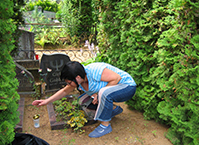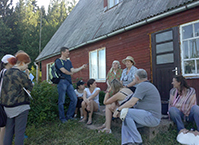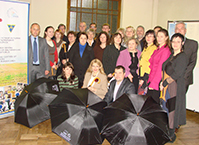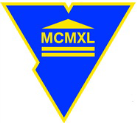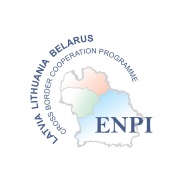E-MUSEUM “VITAMEMORIAE”: COLLECTION AND RESEARCH
Foto
To record people’s life stories, traditions, customs, rituals, rare photographs, old documents, ethnographic differences in funeral rites, etc. the researchers of Daugavpils University and Yanka Kupala Grodno State University carried out field studies in LV and BY territories: in the villages of Krāslava, Rēzekne, Daugavpils regions (Asūne, Foļvarka, Kruki, Skrudaliena, Indra, etc.) and in Belarus (Braslav and Vitebsk districts). The field studies were implemented in the framework of the project “Popularization of the Centres of Oral History in the LV – BY Cross-Border Area”, ID Nr. LLB–2–143, of the Cross Border Cooperation Programme Latvia–Lithuania–Belarus implemented within the framework of the European Neighbourhood and Partnership Instrument 2007–2013.
During the research and the expeditions, the project implementers collected, segmented, transcribed, and digitized the audio-visual materials (audio and video records, photo evidence). To make the collection of the E-Museum more complete, the field researchers and cemetery researchers of Daugavpils University and Grodno University will segment and systematize the audio-visual materials collected during oral history, cemetery research, folklore and dialectology expeditions of the previous years that until now have not been used, aiming at including the best and most valuable segments of the collection into the E-Museum.
The story tellers whose life stories make the input of the E-Museum are people of various generations, mostly elderly people. The childhood of aged people, who at present are about 80 years old, proceeded in the 1930s, therefore the segmented audio-visual units included in the E-Museum chronologically begin from 1929 and can describe only the respondents’ childhood memories. The memory of the older generation is particularly important for the anthropological and historical research – it shifts the time borders, allows for moving to the events of the past through the viewpoints of those who have experienced those times. The facts can be found in chronicles, but what the witnesses of that time can reveal give the memories colour, scent, involve one into mutual emotional experience. The witnesses of the epoch tell about the events form the viewpoint of their own experience.
To motivate the respondents to share their life stories, the project field researchers used Paul Thomson’s oral history research method – enlarged vision of social history where diverse groups of the society are brought together and share common historical experience.
The research basis is the methodology of a semi-structured interview that envisages focused (guided) reconstruction of the past events and an interviewer only helps the respondents to reconstruct the past.
The oral history collection of the E-Museum is envisaged to be used not only by specialists but also by a greatest possible range of non-specialists, therefore, departing from the academic tradition envisaging a complete script and transcript (written transcription of an audio or video record) of life stories, the project experts agreed to segment 360 most vivid, colourful, expressive, unusual, typological or extraordinary audio-visual units (photo, video and audio testimonies) – thematically complete excerpts, and to systematize them according to the thematic plan that would encompass both the historical processes of the 20th century (from the 1920s-30s) and the most essential events of an individual’s life.
ACCESSIBILITY OF THE COLLECTION
The interviews included into the collection are arranged according to the principle of historicism, anthropologism and personalia, indicating the author’s name and the interviewer’s name and surname.
-
The strong alcohol
Do you know and could you tell me how was homemade strong alcohol made in Latgale in former times?
I can tell you how my parents made it at home. Homemade strong alcohol was cheaper that the one …
Researcher: Dr. philol. Valentīns Lukaševičs, Daugavpils Universitāte
Categories: Eriks Zachs
-
Could you tell me how cheese was made in the countryside?
Here in Latgale, two kinds of cheese were made in those times. One was the simple salted curd cheese, which my mother, as well as my father’s godmother, who was by father’s sister, made. …
Researcher: Dr. philol. Valentīns Lukaševičs, Daugavpils Universitāte
Categories: Eriks Zachs
-
What could you tell me about celebrating Līgo [Midsummer night festivities]?
I live in Ančupāni, Rēzekne district. I was born in 1964. In the second half of the seventies, Līgo was usually celebrated at the neighbours’. I live in Hill Ančupāni, the neighbours’, …
Researcher: Dr. philol. Valentīns Lukaševičs, Daugavpils Universitāte
Categories: Eriks Zachs
-
What are the most vivid memories from what has been told to you by your father, grandfather, other senior people?
I remember my father’s stories that are related to the Latvian writer Jānis Jaunsudrabiņš. My father attended Sološnieki school, which was located in our former family house. …
Researcher: Dr. philol. Valentīns Lukaševičs, Daugavpils Universitāte
Categories: Eriks Zachs
-
Maybe you remember something else that older people have told you?
Older people, who are my father, his god-mother or my father’s father’s sister have told me and also my father’s sisters and other relatives from my father’s side have told me …
Researcher: Dr. philol. Valentīns Lukaševičs, Daugavpils Universitāte
Categories: Eriks Zachs
-
Do you observe fasting in your family nowadays and what is fasting related to in such a physical, spiritual meaning?
Since my family is Catholic, we do observe Catholic traditions, including the fast. The traditional dishes of the fast usually include boiled potatoes, maybe with some linseed oil, or maybe with …
Researcher: Dr. philol. Valentīns Lukaševičs, Daugavpils Universitāte
Categories: Dagnija Bramane
-
Celebration of Christmas
Christmas is traditionally connected with going to church. In our family, everybody is Catholic and so we all together go to church. When we return from the church, it is the eve of the religious …
Researcher: Dr. philol. Valentīns Lukaševičs, Daugavpils Universitāte
Categories: Dagnija Bramane
-
The bathhouse traditions
Yes, we have a black bathhouse, i.e. the smoke is not let through the chimney, but it fills the whole bathhouse, therefore the walls are black and it is called a black bathhouse. We have thought that …
Researcher: Dr. philol. Valentīns Lukaševičs, Daugavpils Universitāte
Categories: Dagnija Bramane
-
About the acorn drink and dandelion root drink.
You, Dagnija, use the old time recipes to prepare acorn drink and dandelion root drink, which are called acorn or dandelion coffee, don’t you?
Yes, it’s a fact that I like to …
Researcher: Dr. philol. Valentīns Lukaševičs, Daugavpils Universitāte
Categories: Dagnija Bramane
-
The bread's baking traditions
In your family you bake bread yourselves, don’t you?
Yes, we still preserve this tradition of the olden times and we do bake bread at home. The holder of the tradition is my grandmother, who …
Researcher: Dr. philol. Valentīns Lukaševičs, Daugavpils Universitāte
Categories: Dagnija Bramane


